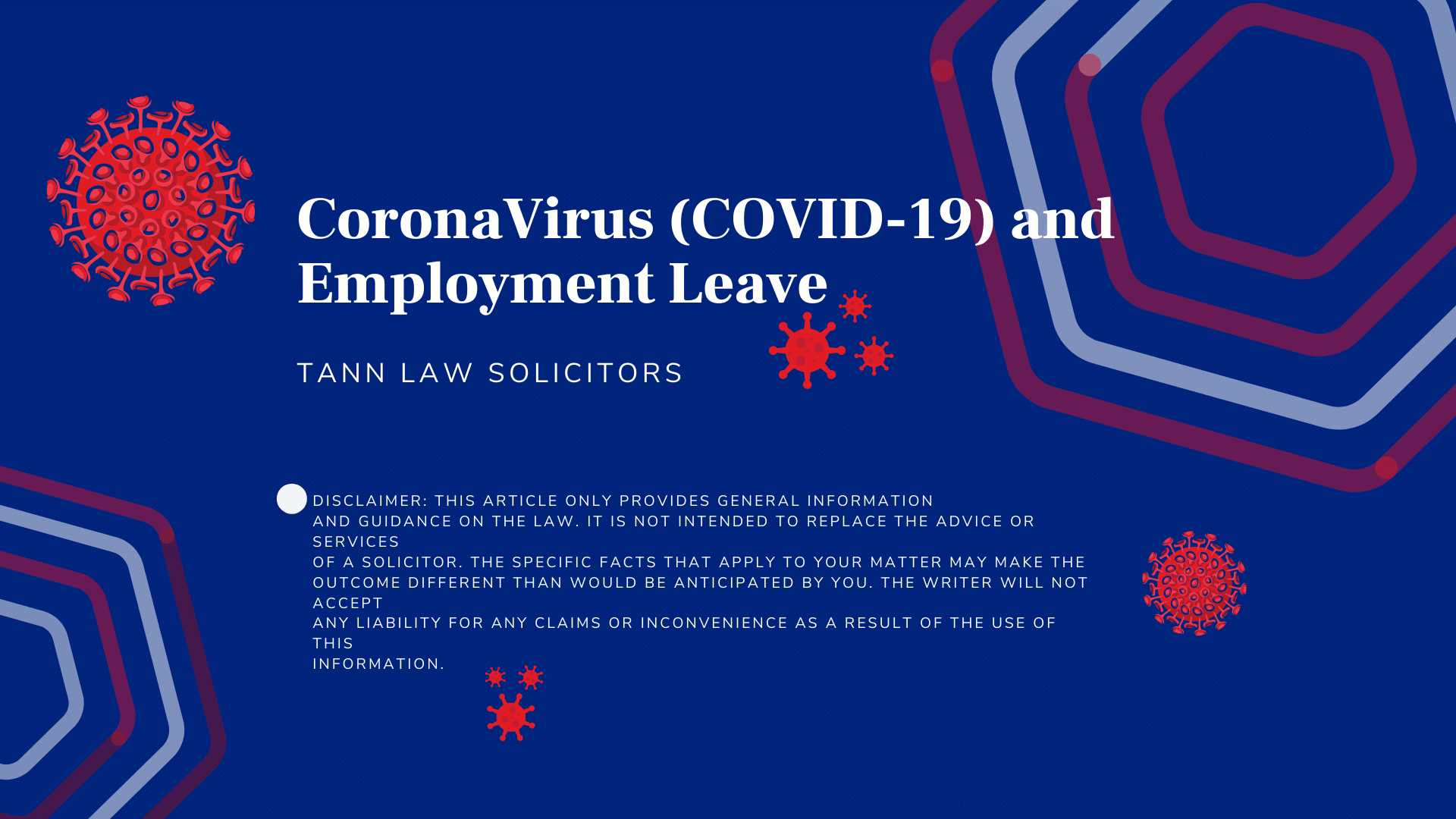CoronaVirus (COVID-19) and Employment Leave
As most of us will be aware, the British government has announced a lockdown. This has, in turn, affected several businesses which had to temporarily close mainly because of the government directive. The government has announced an array of measures in a bid to keep the businesses operation once this CoronaVirus COVID 19 outbreak is over. In this article, we look at the types of leave available to employees who are affected.
Unpaid Leave
The Government has announced a range of new measures around SSP and emergency legislation has been brought forward since the 13th of March 2020 to ensure that an employee gets £94.25 Statutory Sick Pay (SSP) from the first day they self-isolate where they have symptoms or their family member has symptoms and cannot work.
The employee may then be entitled to claim other public fund benefits subject to qualification. An employee cannot receive less than the statutory amount of £94.25. However, an employee can get more if the employee’s company has a sick pay scheme (or ‘occupational scheme’) that pays more than the statutory sick pay (check your employment contract).
By law, medical evidence is not required for the first 7 days of sickness. After 7 days, employers may use their discretion around the need for medical evidence if an employee is staying at home. If evidence is required to cover self-isolation or household isolation beyond the first 7 days of absence, then employees can get an isolation note from NHS 111 line or from the NHS website.
Anyone not eligible to receive sick pay, including those earning less than an average of £118 per week, some employees working in the gig economy, or self-employed people, is able to claim UNIVERSAL CREDIT and or contributory Employment and Support Allowance. For those on a low income and already claiming Universal Credit, SSP designed to automatically adjust depending on people’s earnings or other income.
Paid leave
An alternative option to providing statutory sick pay is to allow employees who are asked to self-isolate but are not unwell, to work from home wherever possible, and continue to pay as normal or to take paid leave. However, this appears to be unfair to ask an employee to take paid leave as a result of an outbreak.
Government advice to “self – quarantine” on returning from certain destinations
If this applies to you, your employer should ask you NOT to come to work until after the incubation period is over and any symptoms have completely disappeared.
Employer Duty of Care
Your employer should take steps that are reasonably necessary to ensure the health, safety and welfare of all their employees, (you and your colleagues). If you refuse to cooperate, or recklessly risk your own health or that of colleagues or customers, you could be disciplined.
Employers should take simple precautions to protect your health and safety:
Currently, there is no vaccine for the coronavirus (unlike flu), so those at high risk cannot protect themselves. Your employer may consider moving you to a different location or asking you to work from home.
Refusal to attend work
What is the position if the employer thinks it is safe to attend work, but you are reluctant to do so because of fears of infection?
Your employer should assess the risk regularly, consulting government websites for updates, and consider their staffing requirements and how many people they need in the workplace. It may be possible to allow employees who wish to do so to work from home or to take holiday.
If you are reluctant to attend work discuss this with your employer.
Discrimination
Your employer could be vicariously liable if staff racially harass colleagues of specific nationalities, even if the employer does not know and would disapprove of such behaviour.
Employers will avoid liability if they can show that they took “all reasonable steps” to prevent employees from behaving in such a manner. Taking reasonable steps might mean having well-publicised diversity and harassment policies and training all staff on the issue.
Whether or not a claim against an employer (for prohibiting travel to other countries) would succeed would depend on whether the employer’s reasons for forbidding the travel are legitimate and its actions are proportionate. Your reason for wishing to travel might be relevant here e.g. bereavement. However, due to the current national crisis, claims of discrimination, for this reason, are unlikely to succeed.
If the staff of Chinese ethnic origin are asked not to come to work during the coronavirus outbreak, this could lead to direct race discrimination claims.
Any request not to attend work should be related to potential exposure to the virus and should apply to all staff regardless of nationality or ethnicity.
Other considerations;
If your child’s school has been forced to close and you cannot attend work due to care commitments, you may be entitled to statutory unpaid time off via Time off for Dependents legislation.
It would be worth checking in such circumstances if your employer has a more favourable policy in terms of receiving payment or whether they would exercise their discretion to pay.
Employees are entitled to time off work to help someone who depends on them (a ‘dependant’) in an unexpected event or emergency. This would apply to situations related to coronavirus (COVID-19). For example:
If they have children they need to look after or arrange childcare for because their school has closed
To help their child or another dependant if they’re sick, or need to go into isolation or hospital
There’s no statutory right to pay for this time off, but some employers might offer pay depending on the contract or workplace policy.
My employer wants me to come to work even though I feel ill, what should I do?
Employees should take time off work if they are ill. Government is clear that employers should support their staff’s welfare, especially during an extended response.
My employer wants me to come to work. How do I respond when I don’t have a sick note?
Employees should take time off work if they’re ill.
By law, medical evidence is not required for the first 7 days of sickness (that is, employees can self-certify). After 7 days, it is for the employer to determine what evidence they require, if any, from the employee.
Employers must respect the need to stay at home where they are following government advice to do so and to show flexibility in the evidence they require from employees.
What about if I have a zero hours contract?
You may be entitled to Statutory Sick Pay. Check with your employer if you’re unsure.
If you’re not entitled to Statutory Sick Pay, you may be able to apply for Universal Credit or Employment and Support Allowance (ESA).
What Options does my employer have?
- If your employer’s business has not been affected by COVID-19 and is not affected by self-isolation requirements/the close-down, he may ask you to work as usual.
- Furlough leave – your employer may make you temporarily redundant in order to suit the business needs and cut spending due to the economic conditions resulting from COVID-19. You will still retain your job/position without necessarily working. The UK government will 80% of your salary up to £2 500 per employee. The other 20% is discretionary, this means, your employer can decide whether or not to pay you.
- Sick leave/Unpaid leave – This is the option you as an employee takes time out of work to care for a family member such as children who are out of school because of the Coronavirus issue or an employee is self- isolating. You will be entitled to the Statutory sick pay.
- Paid leave – You can get your paid leave days/holiday as usual. However, if you have already exhausted all your annual leave allowance, yet you are not sick/taking care of a sick dependant/family member, this leave becomes unpaid.
What about if I’m self-employed?
You can apply for Universal Credit. Look out for government legislation over this body of workers as there are current proposals being made over this subject matter.
What if the whole family has to stay at home and there’s no income coming in?
If no one is getting Statutory Sick Pay, the family can apply for Universal Credit.
Employers should treat all staff consistently or they may risk discrimination claims.
Andrew Nyamayaro is the principal of Tann Law Solicitors. Specialist immigration, employment, family, charity and corporate law firm in Coventry.
Andrew can be contacted on e-mail info@tannlaw.co.uk or office phone 02477 632323
Disclaimer: This article only provides general information and guidance on the law. It is not intended to replace the advice or services of a solicitor. The specific facts that apply to your matter may make the outcome different than would be anticipated by you. The writer will not accept any liability for any claims or inconvenience as a result of the use of this information.

